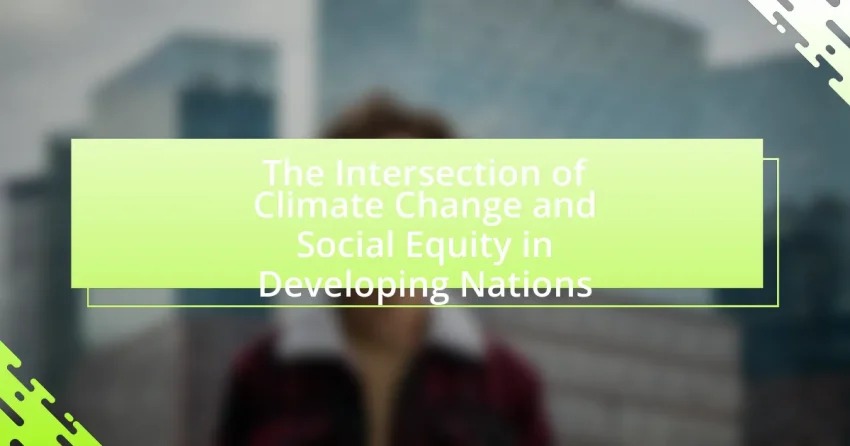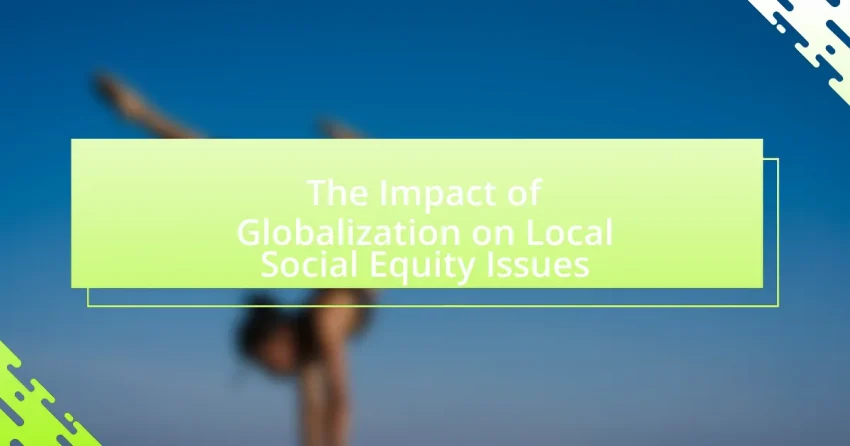Urbanization and social equity are critical issues facing global cities, characterized by the uneven distribution of resources, access to essential services, and the impact of urban policies on marginalized communities. The article examines how urbanization can exacerbate inequalities, particularly in housing, education, and healthcare, while highlighting the systemic factors contributing to social inequities. It discusses…
Youth Activism and Its Role in Shaping Social Equity Policies Worldwide
Youth activism refers to the engagement of young individuals in advocating for social change and justice, significantly impacting social equity policies worldwide. This article explores the evolution of youth activism, highlighting its historical influences, key issues such as climate change and racial justice, and the role of digital platforms in mobilization. It examines the challenges…
Understanding Racial and Ethnic Disparities in Global Contexts
Racial and ethnic disparities in global contexts refer to the unequal treatment and outcomes experienced by different racial and ethnic groups across various domains, including health, education, employment, and criminal justice. These disparities are rooted in systemic inequalities, historical injustices, and socio-economic factors that disadvantage specific groups. The article examines how these disparities manifest in…
The Role of NGOs in Promoting Social Equity Across Borders
Non-Governmental Organizations (NGOs) play a vital role in promoting social equity across borders by advocating for marginalized communities, facilitating access to resources, and influencing policy changes. They define social equity as the fair distribution of resources and opportunities, focusing on principles such as fairness, access, participation, and rights. The article explores how cultural differences shape…
The Role of Grassroots Movements in Advancing Social Equity
Grassroots movements are collective actions initiated by ordinary individuals at the community level aimed at addressing social issues and advocating for change. These movements play a vital role in promoting social equity by empowering marginalized groups, amplifying their voices, and mobilizing resources to challenge systemic inequalities. The article explores how grassroots movements contribute to social…
The Role of Education in Promoting Social Equity Globally
The article examines the critical role of education in promoting social equity on a global scale. It highlights how access to quality education can reduce disparities in income, health, and opportunities, particularly for marginalized groups. Key principles of social equity in education, such as access, participation, and outcome equity, are discussed alongside the challenges faced…
The Intersection of Climate Change and Social Equity in Developing Nations
The article examines the critical intersection of climate change and social equity in developing nations, highlighting how marginalized communities disproportionately suffer from climate-related impacts due to existing inequalities. It discusses the key factors influencing climate change in these regions, such as deforestation and industrial emissions, and emphasizes the importance of equitable climate policies that address…
The Relationship Between Labor Rights and Social Equity in the Global Economy
The article examines the intrinsic relationship between labor rights and social equity within the global economy, emphasizing how the protection of labor rights—such as fair wages, safe working conditions, and the right to organize—contributes to reduced income inequality and enhanced social mobility. It highlights key components of labor rights and their impact on marginalized communities,…
The Impact of Globalization on Local Social Equity Issues
The article examines the impact of globalization on local social equity issues, highlighting how it exacerbates income inequality and marginalizes vulnerable populations. It discusses the dual nature of globalization, which can create economic opportunities while simultaneously increasing disparities in wealth and access to resources. Key factors influencing social equity include economic integration, labor mobility, and…
The Influence of Policy Frameworks on Social Equity in International Development
The article examines the influence of policy frameworks on social equity in international development, highlighting how these frameworks establish guidelines that shape resource allocation and access to services for marginalized groups. It discusses the key components of effective policy frameworks, such as inclusive participation and equitable resource distribution, and their impact on social equity outcomes….









